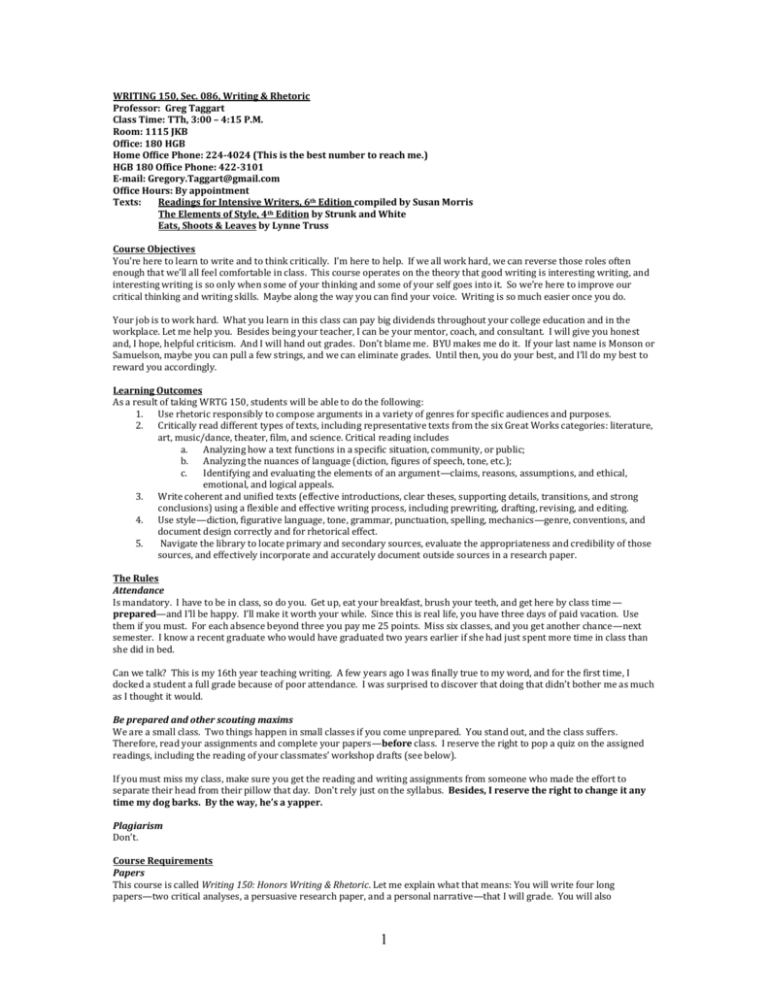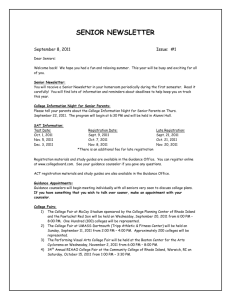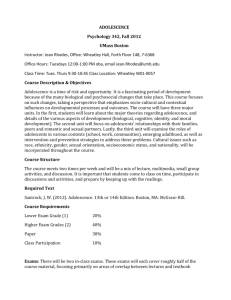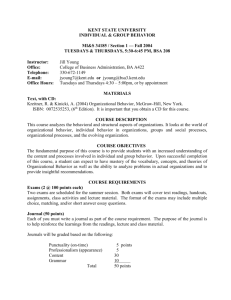Syllabus_Writing 150.086_Fall.2014
advertisement

WRITING 150, Sec. 086, Writing & Rhetoric Professor: Greg Taggart Class Time: TTh, 3:00 – 4:15 P.M. Room: 1115 JKB Office: 180 HGB Home Office Phone: 224-4024 (This is the best number to reach me.) HGB 180 Office Phone: 422-3101 E-mail: Gregory.Taggart@gmail.com Office Hours: By appointment Texts: Readings for Intensive Writers, 6th Edition compiled by Susan Morris The Elements of Style, 4th Edition by Strunk and White Eats, Shoots & Leaves by Lynne Truss Course Objectives You’re here to learn to write and to think critically. I’m here to help. If we all work hard, we can reverse those roles often enough that we’ll all feel comfortable in class. This course operates on the theory that good writing is interesting writing, and interesting writing is so only when some of your thinking and some of your self goes into it. So we’re here to improve our critical thinking and writing skills. Maybe along the way you can find your voice. Writing is so much easier once you do. Your job is to work hard. What you learn in this class can pay big dividends throughout your college education and in the workplace. Let me help you. Besides being your teacher, I can be your mentor, coach, and consultant. I will give you honest and, I hope, helpful criticism. And I will hand out grades. Don’t blame me. BYU makes me do it. If your last name is Monson or Samuelson, maybe you can pull a few strings, and we can eliminate grades. Until then, you do your best, and I’ll do my best to reward you accordingly. Learning Outcomes As a result of taking WRTG 150, students will be able to do the following: 1. Use rhetoric responsibly to compose arguments in a variety of genres for specific audiences and purposes. 2. Critically read different types of texts, including representative texts from the six Great Works categories: literature, art, music/dance, theater, film, and science. Critical reading includes a. Analyzing how a text functions in a specific situation, community, or public; b. Analyzing the nuances of language (diction, figures of speech, tone, etc.); c. Identifying and evaluating the elements of an argument—claims, reasons, assumptions, and ethical, emotional, and logical appeals. 3. Write coherent and unified texts (effective introductions, clear theses, supporting details, transitions, and strong conclusions) using a flexible and effective writing process, including prewriting, drafting, revising, and editing. 4. Use style—diction, figurative language, tone, grammar, punctuation, spelling, mechanics—genre, conventions, and document design correctly and for rhetorical effect. 5. Navigate the library to locate primary and secondary sources, evaluate the appropriateness and credibility of those sources, and effectively incorporate and accurately document outside sources in a research paper. The Rules Attendance Is mandatory. I have to be in class, so do you. Get up, eat your breakfast, brush your teeth, and get here by class time— prepared—and I’ll be happy. I’ll make it worth your while. Since this is real life, you have three days of paid vacation. Use them if you must. For each absence beyond three you pay me 25 points. Miss six classes, and you get another chance—next semester. I know a recent graduate who would have graduated two years earlier if she had just spent more time in class than she did in bed. Can we talk? This is my 16th year teaching writing. A few years ago I was finally true to my word, and for the first time, I docked a student a full grade because of poor attendance. I was surprised to discover that doing that didn’t bother me as much as I thought it would. Be prepared and other scouting maxims We are a small class. Two things happen in small classes if you come unprepared. You stand out, and the class suffers. Therefore, read your assignments and complete your papers—before class. I reserve the right to pop a quiz on the assigned readings, including the reading of your classmates’ workshop drafts (see below). If you must miss my class, make sure you get the reading and writing assignments from someone who made the effort to separate their head from their pillow that day. Don’t rely just on the syllabus. Besides, I reserve the right to change it any time my dog barks. By the way, he’s a yapper. Plagiarism Don’t. Course Requirements Papers This course is called Writing 150: Honors Writing & Rhetoric. Let me explain what that means: You will write four long papers—two critical analyses, a persuasive research paper, and a personal narrative—that I will grade. You will also 1 participate in on-line discussion groups, write home often, and compose a number of shorter papers, all of which will be pass/fail. Unless you have some unusual gift, make “revise, revise, revise” your mantra. Clear, concise, interesting writing does not just happen. To help you be more clear and concise in your writing, here’s what we’ll do in class: 1. 2. 3. 4. 5. Over the course of the semester, each of you will participate in a peer review of each of your four major papers. Don’t worry, it won’t hurt a bit, and it will help a lot. In the peer review, three to four of your classmates will offer criticism and helpful hints on how you can improve your paper. At least 24 hours before you peer review your paper, you must post a draft of the paper on Digital Dialog. Your fellow peer-review classmates will read your paper on Digital Dialog before class and come prepared to give you informed feedback. To insure that they read your paper before class, they must post at least three comments on Digital Dialogue before class. At least one of those comments must be global (structure, organization, theme, and the like). The others must be about content. If they note some egregious word choices, they are free to point that out as well. Please bring hard copies of your paper to class on the day you do peer review. (I’ll tell you how many once we know for sure how many will be in class.) I will also give you written feedback on the draft of your paper you post on Digital Dialogue. Very Important: About those peer review drafts: First, it is your responsibility to post a complete draft (at a minimum they must meet page requirements) and on time. Second, it’s also your responsibility to read each other’s drafts and come to class prepared to give honest and thoughtful criticism. If you don’t post a complete draft on time, I may—in my absolute discretion—decide not to peer review that draft. For your information, a rough draft, hastily written the night before will likely not meet my definition of complete. Another very important point: One of the keys to good writing is caring about your audience. Sloppy, lazy, muddled, disorganized first-drafts posing as polished final drafts show me you don’t care about me—a member of your audience—or your writing. Just a note: Some of what you write I will read carefully and make comments on. Some of what you write I’ll merely check to make sure that you wrote it. You may even write something that I never see. In all cases, the writing I assign is important because the more you write and the more audiences you write to, the quicker you will find your voice, and the more your writing will improve. Beyond Workshops One of the benefits of this class is the chance to peer review your papers with your classmates, both in-class and online. Honest, helpful criticism will help you become a better writer. Don’t be afraid of this exercise. Set your ego—or lack thereof— aside and jump in. If they are honest with you and if you pay humble attention, your writing will improve exponentially. But don’t stop there. Ask me. Ask your roommate. Go to the writing labs in the Morris Center, Cannon Center, Grant Building, or 4026 JKB and ask for a second opinion. And make sure that second opinion is worth the trouble to get it. Ask them to be specific. Demand that they be honest. And here’s a bonus: If you go to the Writing Center to discuss a paper, I will give you 5 points extra credit for that paper. Word Process those Puppies You must word process all drafts of every paper; I don’t care how good your handwriting is. One-inch margins, 12-point type, and double spacing are like an apple on the teacher’s desk. Oh, and MLA style is the rule. Don’t know what MLA style is? You can find help on the Writing Center’s website: http://english.byu.edu/writingcenter/handouts/FormattingStyleGuides/mla.htm, You can also find help on the HBLL website: http://guides.lib.byu.edu/content.php?pid=44757&sid=359918. I will not spend much time teaching MLA style in class. FINALLY, IF YOU DON’T HAVE A STAPLER, BUY ONE! Late papers Don’t do this. Papers are due on the date indicated in the class calendar. You must upload all major papers to Learning Suite by the time indicated on the assignment. After that they are late. I’ll dock you one full letter grade (A to B, for example) for each 24-hour period—or increment thereof—that it is late. Try to turn it in 96 hours late, and your grade will bear an eerie resemblance to the name of a famous Japanese WWII fighter plane. Are there exceptions to the rule? Yes, but they all require you to talk to me in advance. And no, I don’t mean five minutes in advance. A word to the wise: I can deal with almost anything, but I’ve found I don’t respond well to deception, lame excuses, and manipulation. Also, you’re not excused from being prepared for class just because a paper is due that day. I expect you to be in your chair, prepared, and ready to enlighten the rest of us. In short, be a professional. But what about that mercy thing we’ve heard so much about? OK. OK. I can be merciful. But exceptions to my general rules require exceptional excuses. On-line Discussion Groups We’ll have an on-line discussion group on Digital Dialogue where you can post your thoughts on the latest reading or on something else you’ve read or thought or felt. Then you can watch as your classmates respond to, argue against, or ignore your post. What fun! You’ll find the discussion groups on Digital Dialog in Learning Suite. Note that you receive credit for your participation in the discussion groups. An even greater benefit is that you’ll have a different audience to write to. I check 2 the discussion groups once a week to see who’s been naughty or nice. Find a way to post regularly and often, at least 5 times a month, including April. For the math-impaired, that means you must post at least 20 times for full credit on this assignment. Letters Home and Beyond As important as the discussion groups are, letters to your friends and family are even more so. And they are extremely important to your writing ability. These letters are a weekly ordeal that can pay big dividends. In addition to the usual “Hi Mom and Dad” stuff that you’ll write, I’ll give you assignments to try in each letter. And yes, they show up in your final grade. You must keep track of your correspondence in a log that I will provide you. Library Sessions, Tours, and Assignments We will have two class sessions in the HBLL (see Class Calendar for dates). In between the two sessions you must take a library tour and complete a written assignment and a worksheet. We will talk more about this in class as the date for the library sessions arrives. Final Exam and Power of Words Presentations We will use the final exam period for what I call Power of Words Presentations. These are short, 7- to 9-minute, oral presentations about the power of words in your life. To me, these presentations have been one of the highlights of this class. I think you will agree. They also count 100 points or 10% toward your grade. I’ll give you more information on this later. You cannot take it early or late, and it is not optional. So make your plans for departing this great valley accordingly. Residuary Clauses I’m here to help you. If you have problems or concerns about a paper, make an appointment with me. I will always try to make time for you. If I’m not in my office in the HGB, I’m sitting at my computer in my home office. Give me a call, and we’ll work something out. I only ask that you do not call before 8:00 A.M. or after 10:00 P.M. If you’ve written something that you would like me to review, feel free to send it to me via e-mail. I suspect that some of you may try to e-mail me assignments because you are going to miss class. Fine, but know this: I’ll go by the time you sent the email. If you sent it after class starts, it’s late. Also, I use Word. Make sure what you send me is readable in that format (or Text or Rich Text format, if you use something other than Word). Don’t just cut and paste your piece into the e-mail—I find e-mail very hard to grade, so I don’t accept papers in that format. Email E-mail is an excellent communications tool. Outside of class, e-mail will be our primary mode of communication. If you want to contact me via e-mail, do so by writing to Gregory.Taggart@gmail.com. In the subject box, write the following after the word Subject: [Writing 150H]. Having done that, you can then indicate what your email is about. So for example, if you are concerned about a score on a paper, the subject line of your e-mail might look like this: Subject: [Writing 150H] My score on my critical analysis paper. If you fail to do this, I may not see your e-mail and fail to respond. I receive tons of e-mail each day. By following these directions, you enhance the likelihood that I won’t miss yours. Grading There is no curve in my class. You want an A? I’ll give it to you. Of course there’s a catch: You have to earn it. Here’s how: Critical Analysis #1 (3-4 pages) Critical Analysis #2 (4-6 pages) Persuasive Research (8-10 pages) Personal Essay/Narrative (4-6 pages) Power of Words Letters Home Digital Dialogue Six quizzes (drop the lowest score) In-class Participation, etc. 100 points 150 points 300 points 200 points 100 points 25 points 50 points 25 points 50 points 1000 points NOTE: Your workshop drafts of each of the required papers in this class are your first drafts, drafts that I require for each writing assignment in this course. If you are late getting your workshop draft to me, or if you fail to turn the workshop draft in at all, you risk losing up to 10% of your grade on your final paper. Workshop drafts must meet the page limits of the final paper. And by the way, a 3 ½ page paper DOES NOT equal a 4 page paper. Also, your works cited page does not count towards the page requirements. Grading Scale (poins earned/points possible) A 94-100 A90-93 B+ 87-89 B 83-86 B80-82 C+ 77-79 C CD+ D DE 73-76 70-72 67-69 63-66 60-62 0-59 3 Christ-like Behavior It’s unfortunate, but some people seem to need more than the scriptures to teach them how to treat others. For those, and for those who may sometime feel they’ve been mistreated, harassed, or discriminated against, I offer the following: Preventing Sexual Harassment Title IX of the Education Amendments of 1972 prohibits sex discrimination against any participant in an educational program or activity that receives federal funds. The act is intended to eliminate sex discrimination in education. Title IX covers discrimination in programs, admissions, activities, and student-to-student sexual harassment. BYU=s policy against sexual harassment extends not only to employees of the university but to students as well. If you encounter unlawful sexual harassment or gender based discrimination, please talk to your professor; contact the Equal Opportunity Office at 422-5895 or 367-5689 (24-hours); or contact the Honor Code Office at 422-2847. Students with Disabilities Brigham Young University is committed to providing a working and learning atmosphere that reasonably accommodates qualified persons with disabilities. If you have any disability that may impair your ability to complete this course successfully, please contact the University Accessibility Center (422-2767). Reasonable academic accommodations are reviewed for all students who have qualified documented disabilities. Services are coordinated with the student and instructor by the SSD Office. If you need assistance or if you feel you have been unlawfully discriminated against on the basis of disability, you may seek resolution through established grievance policy and procedures. You should contact the Equal Opportunity Office at 4225895, D-282 ASB. Final Exam/Power of Words Presentations Tuesday, December 16 from 8:00 P.M. to 10:00 P.M. We will also have Power of Words presentations on Thursday, December 11, during regular classroom hours. This “final exam” will be a 7- to 9-minute oral presentation that I refer to as Power of Words Presentations. 4 Class Calendar Bring writing you are working on to every class, writing for in this class or another, hard copy or on your computer. WK 1 Date Tues. Sept. 9 Thurs. Sept. 11 3 Tues. Sept. 16 Thurs. Sept. 18 4 5 6 Tues. Sept. 23 “Analysis: The Five-Year-Old and the Detective Look at Picasso,” Nielson; “Writing and Rhetoric: Getting People on the Same Page,” Clark Short Assignments,” Anne Lamott; “Getting Launched,” John Trimble; “Contrasting Characters in Genesis,” Steven C. Walker. 9 10 Tues. Sept. 30 “How to Argue Effectively,” Dave Barry; Writing instruction “Rhetorical Proofs: Ethos, Pathos, and Logos,” Hatch. Thurs. Oct. 2 Meet in HBLL 2233 Library Instruction Tues. Oct. 7 “Argument Forms,” Kendon Kurzer; “What Christians Believe,” C.S. Lewis Writing instruction; “Mother Eve,” Beverly Campbell; “Million-Dollar Murray,” Gladwell. “Sharing and Responding,” Peter Elbow & Patricia Belanoff; “Communication: Its Blocking and Its Facilitation,” Carl Rogers. Writing instruction 11 Library Instruction Writing instruction Critical Analysis#2 Peer Review Writing instruction “Finding Security in Fundamental Freedoms,” Margaret Chase Smith; “Indispensable Opposition,” Lippmann;“How to Argue Effectively,” Dave Barry Thurs. Oct. 23 No Class – Individual conferences in Research Proposal my office 180 HGB Conferences Tues. Oct. 28 “The Declaration of Independence,” Thomas Writing instruction Jefferson; “Public Statement by Eight Alabama Clergymen”;“Letter from Birmingham Jail,” Martin Luther King Thurs. Oct. 30 “Zeal Without Knowledge,” Nibley; “Instruments of the Lord’s Peace,” Wood Tues. Nov. 11 Thurs. Nov. 13 Writing instruction Fishbowl Tues. Nov. 4 “We Do Abortions Here,” Sally Tisdale; “When Nice Ain’t So Nice,” Eloise Bell “In Praise of Ourselves,” William Wilson; “Salvation,” Langston Hughes Research Topic Due – Wednesday, September 24 by Noon Critical Analysis #1 due on Monday, September 29 Writing instruction Tues. Oct. 21 Thurs. Nov. 6 Analysis of Syllabus due. Writing instruction Meet in HBLL 2233 Tues. Oct. 14 Assignments/Bring to Class “On Receiving,” George S. Tate; “Critical Writing instruction Thinking,” Nielson; “Style and Delivery,” Harrison. “The Power of the Word,” McInelly; “Learning Writing instruction to Read and Write,” Frederick Douglas. Critical Analysis#1 Peer Review “Challenging Pleasures of Art,” Dana Gioia; Writing instruction “No Good Stopping Place,” Richard Cracroft. Thurs. Oct. 16 8 Meet at the MOA Thurs. Sept. 25 Thurs. Oct. 9 7 Class Activities Orientation and workshop assignments; Writing instruction. Tues. Sept. 2 Thurs. Sept. 4 2 Readings / Homework (BEFORE CLASS) Writing instruction Writing instruction Persuasive Research Paper peer review 5 Research Proposal draft due Critical Analysis #2 due on Monday, October 27 12 13 14 Tues. Nov. 18 “Night: Feed My Lambs,” Marni AsplundCampbell;“Vision, Revelation, and the Queen of England,” Anna Lewis. Thurs. Nov. 20 “Mother’s Choice,” Quindlen; “Love Story Writing instruction Fades to Black,” Michael Potter; “5-Minutes-aDay Journal,” Plummer. Tues. Nov. 25 FRIDAY INSTRUCTION Thurs. Nov. 27 Thanksgiving Vacation Tues. Dec. 2 “My Lucy Friend Who Smells Like Corn,” Sandra Cisneros 16 Persuasive Research Paper due on Monday, November 24 Writing Instruction Tues. Dec. 9 “My Father’s Sketchbook,” Jessie Hawkes Personal Essay/Narrative peer review Writing instruction Thurs. Dec. 11 Reading on presentations Writing instruction Tues. Dec. 18 Final Exam 3:00 PM – 6:00 PM – Meet in 4??? JSFB Power of Words Presentations Thurs. Dec. 4 15 Writing instruction Fri. Dec. 19 Personal Narrative Due 6






